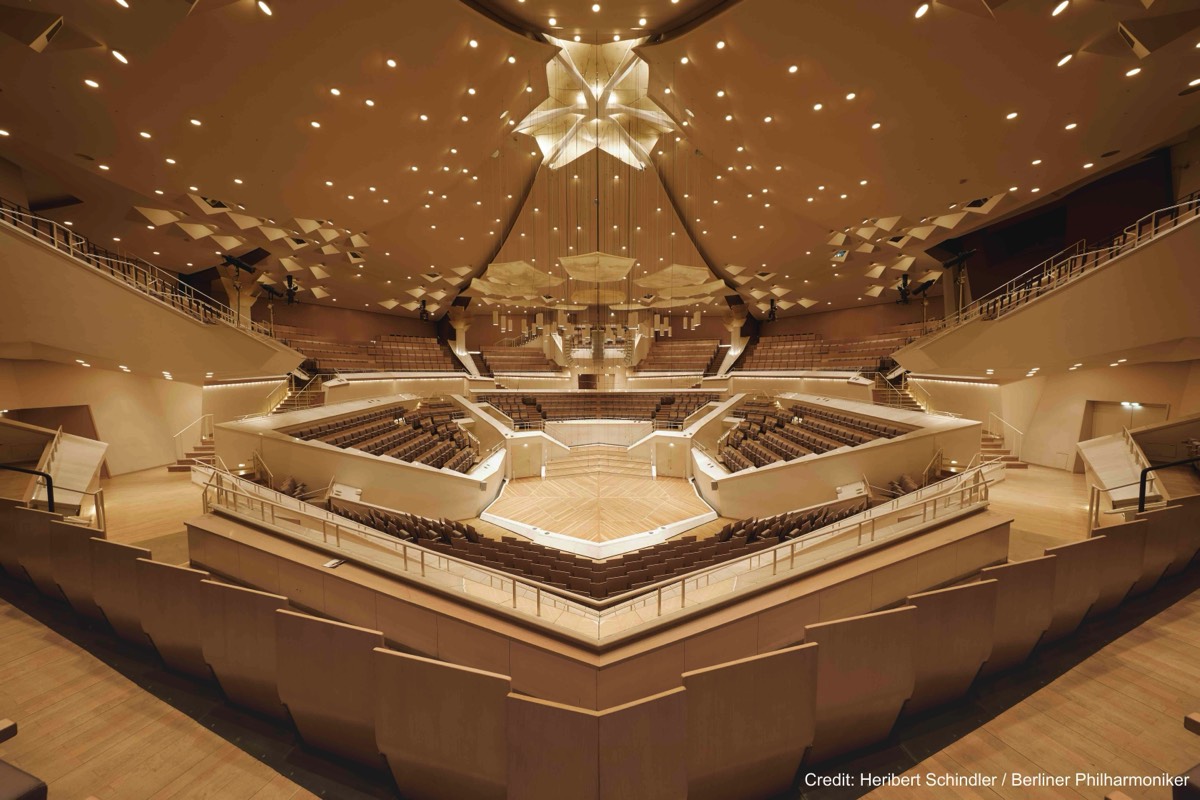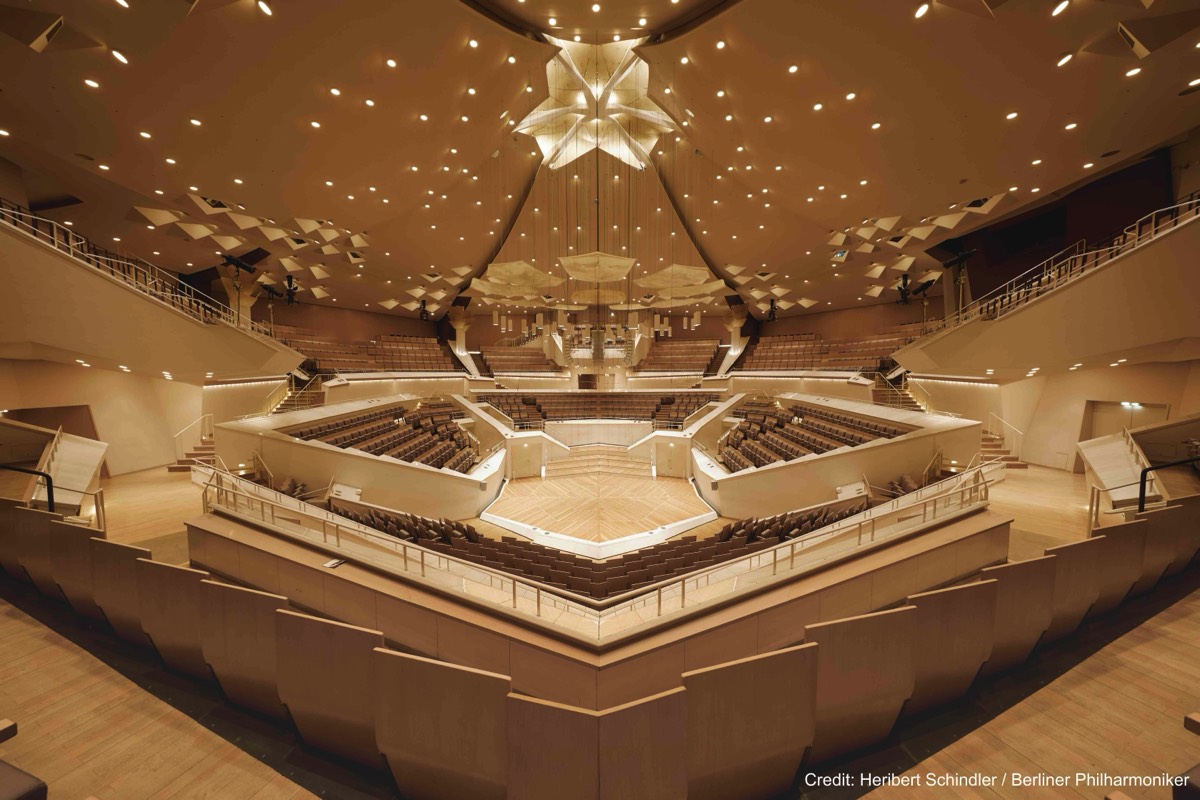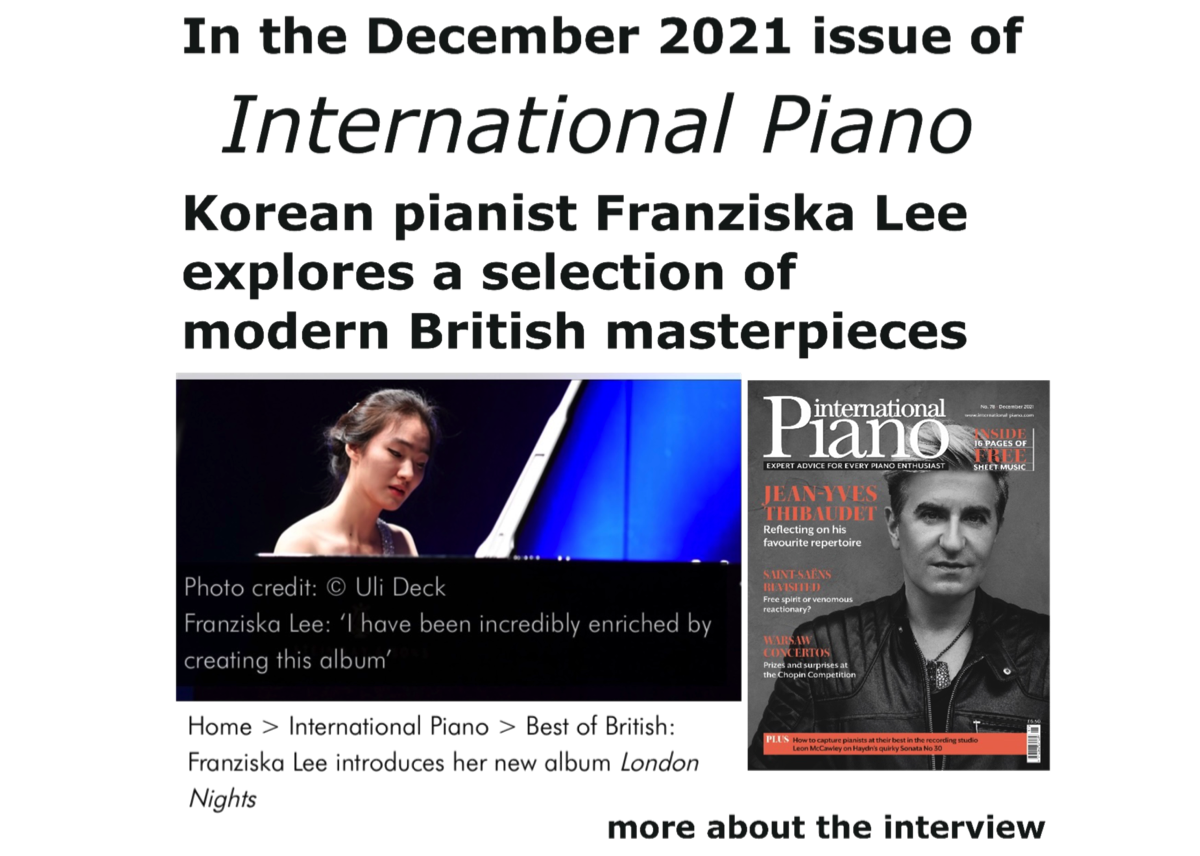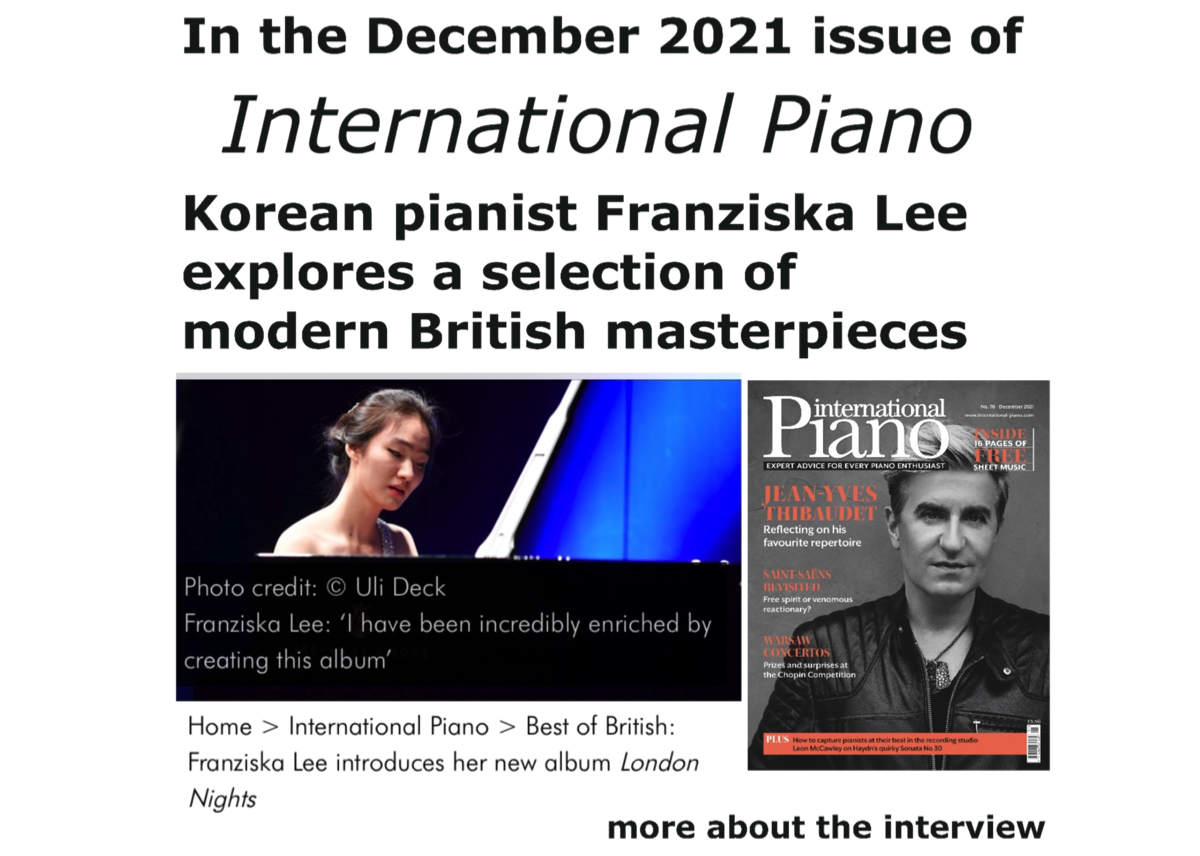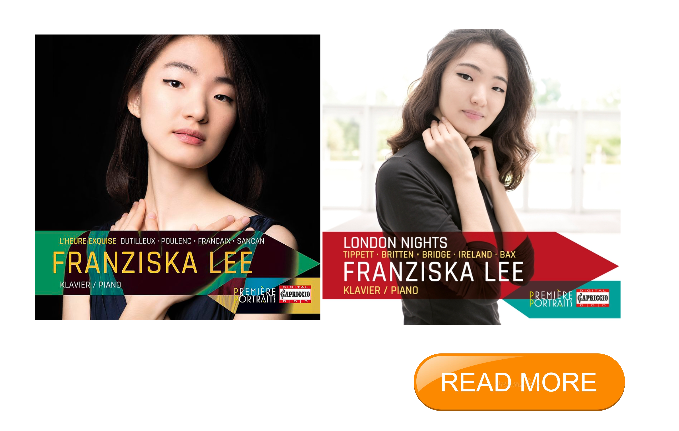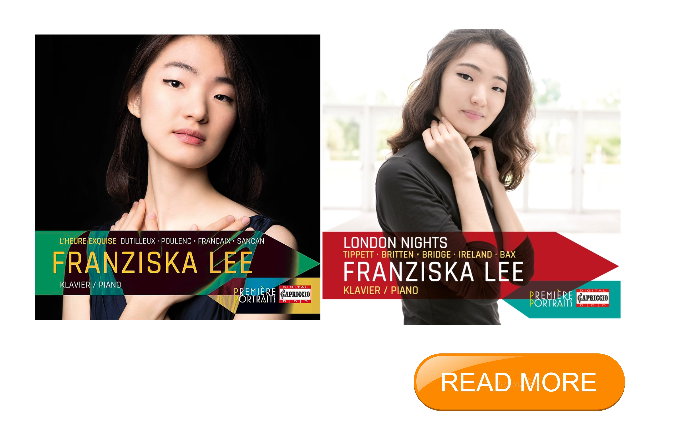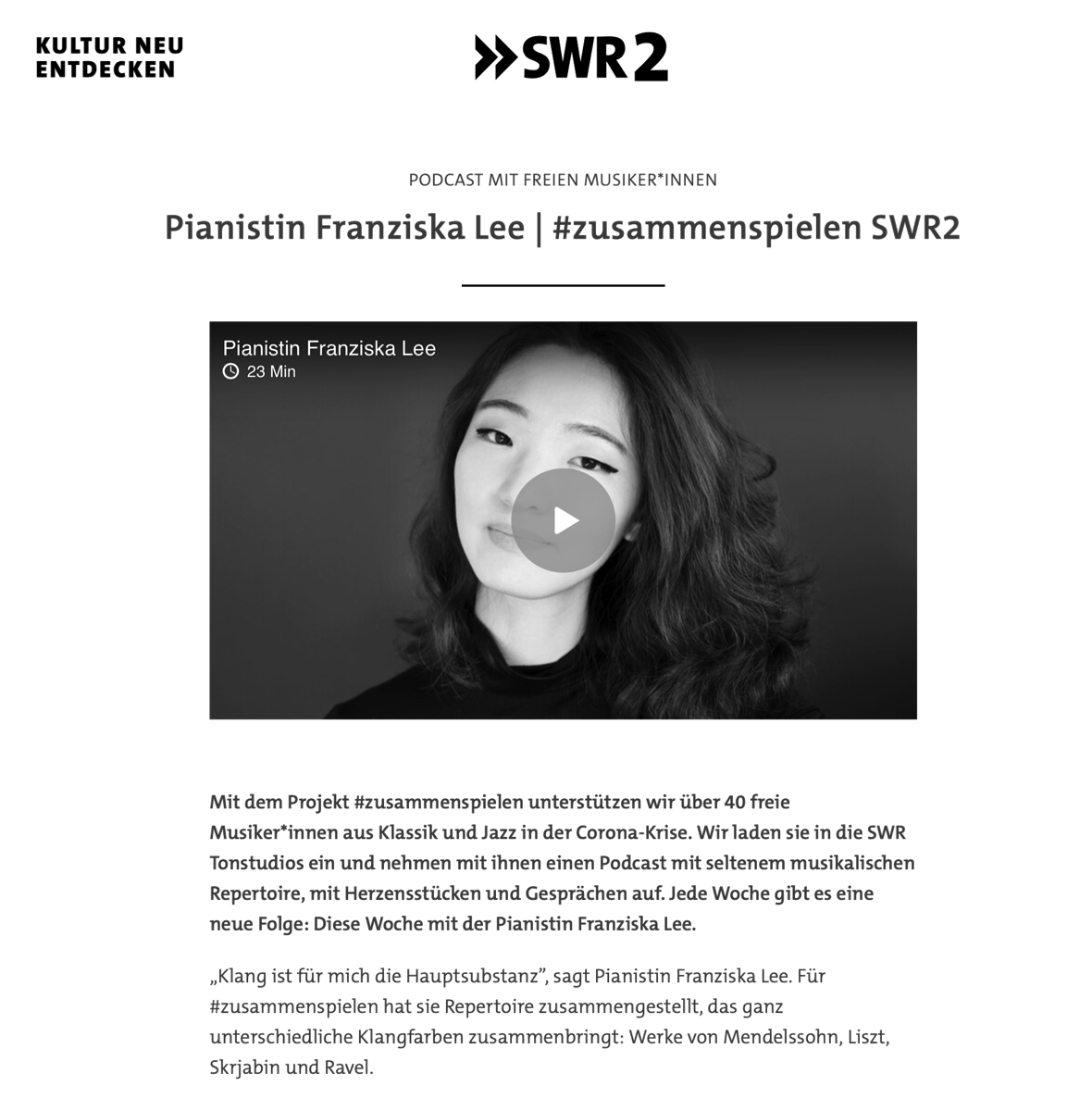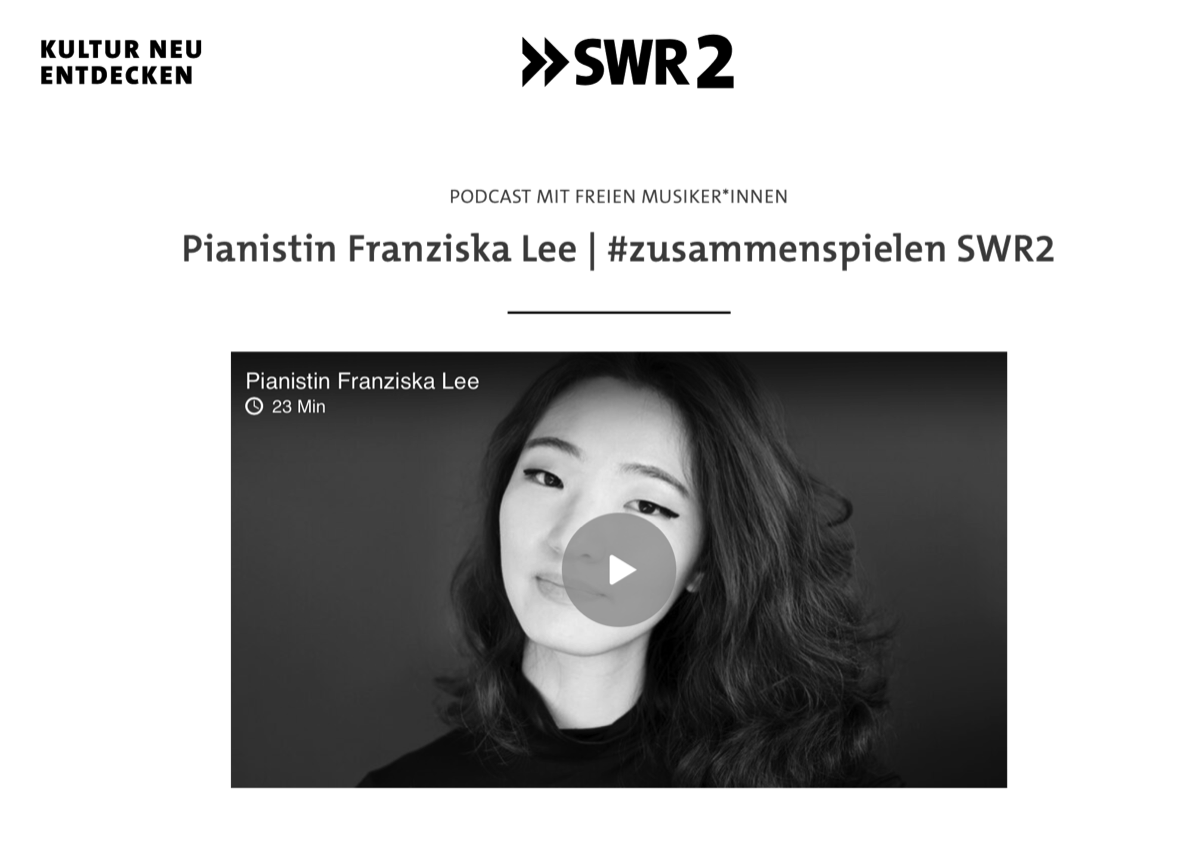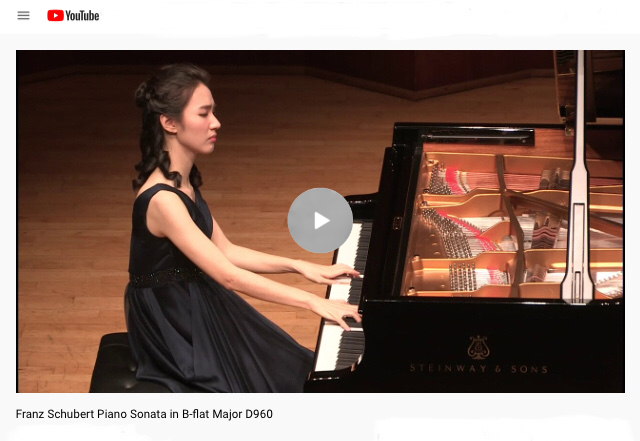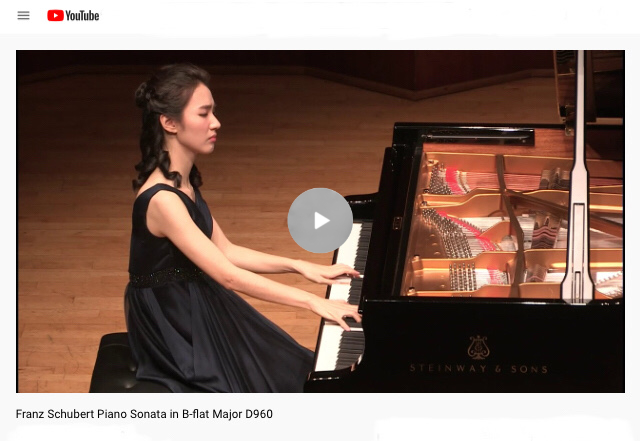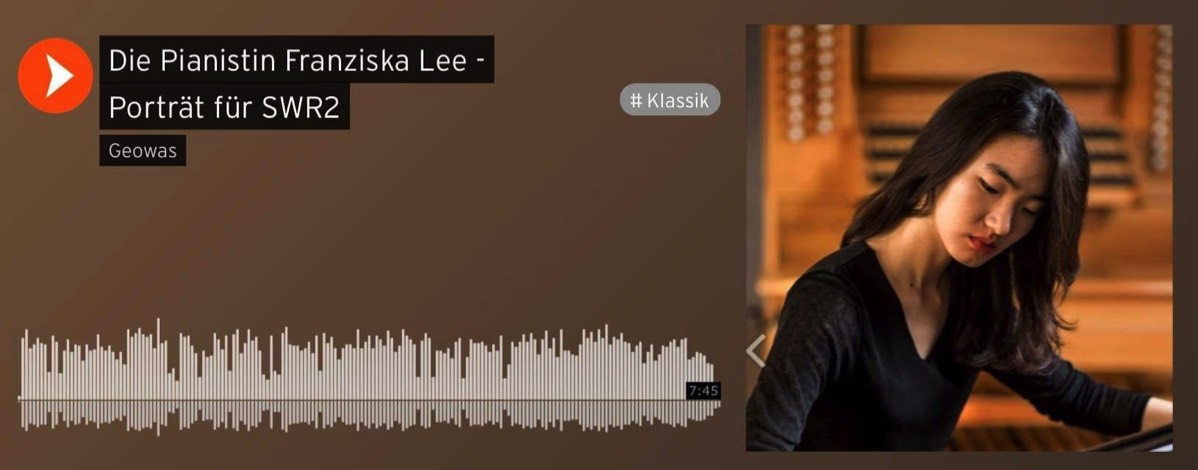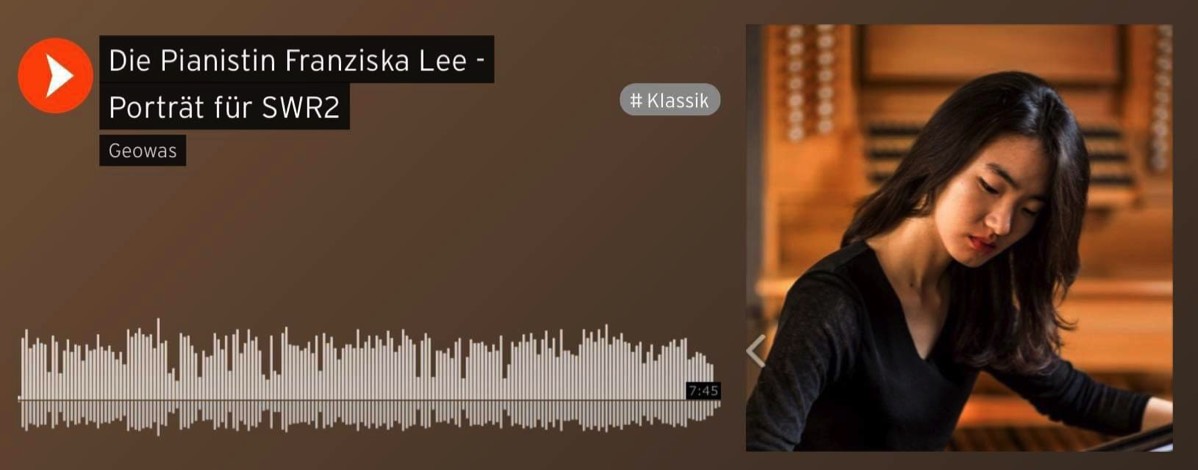.
Die Webseite verwendet zwei notwendige Cookies, die einen Tag gespeichert werden: ein Cookie für die zuletzt verwendete Sprache und ein Cookie im Falle Ihrer Zustimmung. Wenn Sie meine Seite weiter anschauen möchten, sind Sie damit einverstanden! – Einverstanden!The website uses two necessary cookies that are stored one day: a cookie for the last language used and a cookie in case of your consent. If you want to continue viewing my site, you agree! – Accepted!
Interview
• Your debut album L'heure exquise brings together 20th-century piano works by four French composers. For your new album London Nights, you've picked pieces by five 20th-century British composers. What inspired you to adopt this approach?
Each summer since I was eleven years old, I had the pleasure of participating in various music festivals and summer academies in France. This gave me the opportunity to learn about many French composers, some of whom are not well known today. I became particularly fascinated with 20th century French works that, although influenced by the late romantic period, tend to be sharply distinguished from it and define an entirely new segment of music history. I began to feel very close to this music and the culture around it. This led to a strong desire to expand the audience for 20th century piano works by lesser-known French composers. I added several of these works to my regular repertoire, and they became the program of my first album, L'Heure Exquise, which has been well received. It includes the Piano Sonata by Henri Dutilleux, a unique and compelling work that pulls both the performer and the audience. My inspiration is bringing enjoyment to people who otherwise might not experience these amazing works. For my second album, London Nights, I decided to take a similar 20th-century approach, this time focusing on English composers.
• How did you choose the repertoire for London Nights? Were you already familiar with some or all of the pieces, or did you learn them specially for the album?
Rather than recording experimental or avant-garde works, I sought to find a new 20th-century tone and a new color for each composer. Britain has a strong national character and has had an enormous influence on the development of music history. I was not previously familiar with any of the works on London Nights. Rather, I set out to research composers and their respective piano repertoires, endeavoring to be both the interpreter and the listener. I decided to focus on five composers and selected one piece by each for the album. I then studied the pieces specifically for the recording.
• Is London Nights designed to be heard as a recital programme? How do the works fit together?
The program was not designed for recital performance on the stage, but for solely recording. However, I was delighted to discover during private recitals for my friends and colleagues, that the program actually fits together well in recital.
• All five pieces date from a period spanning just over three decades. How stylistically varied are they?
All five pieces were written during a period spanning just over three decades. Yet, they are stylistically quite different, are written in entirely different genres, and have a wide variety of influences. I think music of the first half of the 20th century is incredibly diverse, while, at the same time, it is somehow unified by historical themes. This is especially interesting in England, where music of this period developed with a combination of national sensibility, British folk elements and external influences like French impressionism, Russian nationalism and African-American music.
• Do you have an equal interest in all five composers? Which piece is most closely aligned with your own personality?
I have equal interest in all five works on this program, in giving each the best possible interpretation, in making them all fit together well, and especially in making them accessible to my audience. I assimilate my personality into each piece. You might also say that the pieces influence my personality and make me more fluid, which I greatly enjoy.
• Did you find it easy to assimilate the musical language of all five composers? Were some more challenging than others? Is there a British sensibility or 'national character' that emerges from this music?
In the Frank Bridge work, I found that I could vary my tone color to match his nuances. With John Ireland’s work, I was able to present his music with a lovely texture of colors. Visually, I imagined this piece as an image done in stained watercolor. The Arnold Bax work is in one movement. I endeavored to present its musical development as a whole piece and to build its strong structure without losing its tension. I was challenged by Michael Tippett’s sonata because it was an entirely new language for me. I needed to research and learn more about him and his music. I tried to present his gentle gestures in a balanced form between pride and primness of character. I perceived a strong national character in this work, although there are many interesting influences, such as African-American music, which makes the rhythm especially intense. It was a special pleasure to interpret Britten. His descriptive skill in music is amazing. He is a genius at detail, which offers many possibilities for interpretation by performers. His language is unique.
• You were born in Korea and studied in Germany. How well did you know Britain before embarking on this project? What has it taught you?
Before this project, my repertoire was far away from Britain. One reason I took it on was that I knew it would make me grow, both as a performer and as a person. It taught me how to find a composers’ language and sensibility. It greatly expanded my musical knowledge (Tippett), sensibility (Britten) and experience (Bax), and it sharpened my musical intuition (all five). I have been very enriched by creating this album. It has been an amazingly interesting project and a steady growth process.
• How do you hope audiences will respond to London Nights?
I invite my audiences to open their minds to the musical languages and sensibilities of 20th century British music. With this program, I hope to let people see and experience the characters, colors and musical language of these five outstanding British composers. I have attempted to make them audible and to raise my audiences’ musical taste. It is a production that required a lot of study, research, patience and dedication. I did my best to create a quality work, at the level this British music deserves.
• Your debut album L'heure exquise brings together 20th-century piano works by four French composers. For your new album London Nights, you've picked pieces by five 20th-century British composers. What inspired you to adopt this approach?
Each summer since I was eleven years old, I had the pleasure of participating in various music festivals and summer academies in France. This gave me the opportunity to learn about many French composers, some of whom are not well known today. I became particularly fascinated with 20th century French works that, although influenced by the late romantic period, tend to be sharply distinguished from it and define an entirely new segment of music history. I began to feel very close to this music and the culture around it. This led to a strong desire to expand the audience for 20th century piano works by lesser-known French composers. I added several of these works to my regular repertoire, and they became the program of my first album, L'Heure Exquise, which has been well received. It includes the Piano Sonata by Henri Dutilleux, a unique and compelling work that pulls both the performer and the audience. My inspiration is bringing enjoyment to people who otherwise might not experience these amazing works. For my second album, London Nights, I decided to take a similar 20th-century approach, this time focusing on English composers.
• How did you choose the repertoire for London Nights? Were you already familiar with some or all of the pieces, or did you learn them specially for the album?
Rather than recording experimental or avant-garde works, I sought to find a new 20th-century tone and a new color for each composer. Britain has a strong national character and has had an enormous influence on the development of music history. I was not previously familiar with any of the works on London Nights. Rather, I set out to research composers and their respective piano repertoires, endeavoring to be both the interpreter and the listener. I decided to focus on five composers and selected one piece by each for the album. I then studied the pieces specifically for the recording.
• Is London Nights designed to be heard as a recital programme? How do the works fit together?
The program was not designed for recital performance on the stage, but for solely recording. However, I was delighted to discover during private recitals for my friends and colleagues, that the program actually fits together well in recital.
• All five pieces date from a period spanning just over three decades. How stylistically varied are they?
All five pieces were written during a period spanning just over three decades. Yet, they are stylistically quite different, are written in entirely different genres, and have a wide variety of influences. I think music of the first half of the 20th century is incredibly diverse, while, at the same time, it is somehow unified by historical themes. This is especially interesting in England, where music of this period developed with a combination of national sensibility, British folk elements and external influences like French impressionism, Russian nationalism and African-American music.
• Do you have an equal interest in all five composers? Which piece is most closely aligned with your own personality?
I have equal interest in all five works on this program, in giving each the best possible interpretation, in making them all fit together well, and especially in making them accessible to my audience. I assimilate my personality into each piece. You might also say that the pieces influence my personality and make me more fluid, which I greatly enjoy.
• Did you find it easy to assimilate the musical language of all five composers? Were some more challenging than others? Is there a British sensibility or 'national character' that emerges from this music?
In the Frank Bridge work, I found that I could vary my tone color to match his nuances. With John Ireland’s work, I was able to present his music with a lovely texture of colors. Visually, I imagined this piece as an image done in stained watercolor. The Arnold Bax work is in one movement. I endeavored to present its musical development as a whole piece and to build its strong structure without losing its tension. I was challenged by Michael Tippett’s sonata because it was an entirely new language for me. I needed to research and learn more about him and his music. I tried to present his gentle gestures in a balanced form between pride and primness of character. I perceived a strong national character in this work, although there are many interesting influences, such as African-American music, which makes the rhythm especially intense. It was a special pleasure to interpret Britten. His descriptive skill in music is amazing. He is a genius at detail, which offers many possibilities for interpretation by performers. His language is unique.
• You were born in Korea and studied in Germany. How well did you know Britain before embarking on this project? What has it taught you?
Before this project, my repertoire was far away from Britain. One reason I took it on was that I knew it would make me grow, both as a performer and as a person. It taught me how to find a composers’ language and sensibility. It greatly expanded my musical knowledge (Tippett), sensibility (Britten) and experience (Bax), and it sharpened my musical intuition (all five). I have been very enriched by creating this album. It has been an amazingly interesting project and a steady growth process.
• How do you hope audiences will respond to London Nights?
I invite my audiences to open their minds to the musical languages and sensibilities of 20th century British music. With this program, I hope to let people see and experience the characters, colors and musical language of these five outstanding British composers. I have attempted to make them audible and to raise my audiences’ musical taste. It is a production that required a lot of study, research, patience and dedication. I did my best to create a quality work, at the level this British music deserves.


